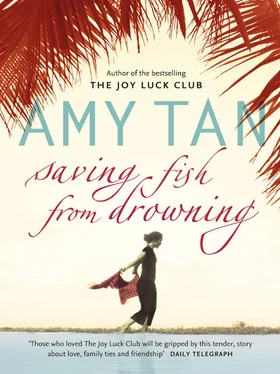“To show they were upper-class,” one person said.
“To point their feet to heaven?” another ventured.
“To hide curved daggers,” a man guessed.
“I’m afraid the answer is less fascinating than that,” I would say before revealing the fascinating fact: “The curled toes lifted the hems of long skirts to prevent the wearers from tripping as they walked the long carpeted halls to pay obeisance to their shah. And thus you see, they are merely practical.” Every time I said this, people were highly impressed, and later, when they saw me again, they would say, “I remember you! You’re the one with the fascinating shoes.”
At the funeral, Zez, the curator at the Asian who oversaw restoration of ancestor commemorative paintings, said I had a style that was “absolutely memorable, as emblematic as the best portraiture of the Sackler collection.” That was a slight exaggeration, of course, but it was heartfelt. I certainly felt pings and pangs in my own late heart. There was even a moment when I could sense the ache of others. I was suffused with shared grief—at last, to feel so deeply—and I was glad, truly this time, that I did not have children, no dear daughters or sweet sons to feel the kind of pain that would have come from losing me as their mother. But all at once, this sadness-gladness evaporated, and I settled into more reflective thought.
To think, in all my life no one had loved me wholly and desperately. Oh, I once believed that Stefan Cheval cared for me in that way—yes, the Stefan Cheval, the famous one with the controversial footnote. This was eons ago, right before that pink-skinned congressman declared his paintings “obscene and un-American.” My opinion? To be perfectly honest, I thought Stefan’s series Freedom of Choice was overwrought and clichéd. You know the one: gouache overlays of U.S. flags draped over images of dead USDA-stamped livestock, euthanized dogs, and computer monitors—or were they television sets back then? In any case, heaps and heaps of excess to show immoral waste. The reds of the flag were bloody, the blues were garish, and the whites were the color of “discharged sperm,” by Stefan’s own description. He was certainly no Jasper Johns. Yet after Stefan’s work was condemned, it was vociferously defended by First Amendment rights groups, the ACLU, scads of art departments at top-notch universities, and all those civil libertarian types. Let me tell you, it was they who conferred upon the work grandiose messages that Stefan never intended. They saw the complexities of meaningful layers, how some values and lifestyles were judged more important than others, and how we, as Americans, needed the shock of ugliness to recognize our values and responsibilities. The rivulets of sperm were especially frequently cited as representing our greed for pleasure without regard to mess and proliferation. In later years, the mess referred to global warming and the proliferation to nuclear weapons. That’s how it happened, his fame. Prices rose. The mere mortal became an icon. A few years later, even churches and schools had posters and postcards of his most popular themes, and franchise galleries in metropolitan tourist centers did a brisk business in selling his limited-edition signed serigraphs, along with prints of Dali, Neiman, and Kinkade.
I should have been proud to have such a famous man in my life. Socially, we were an ideal duo. As to pleasures of the boudoir, I would discreetly admit that there were innumerable wild nights that met the standards of Dionysus. But I could not give up my work to be an addendum to his. And he was always gone to give a paid lecture, to attend the trustees’ annual dinner at the Met in New York, or to drop by ritzy benefits, several a night, for which he would jump out of a dark-windowed Town Car, lend his conversation-stopping presence for twenty minutes, then move along to the next party. When we were together, we enjoyed playful verbal banter. But we were not tender. We expressed no gushing sentiments one might later regret. And so, the seasons passed, the blooms faded, and nature took its course of inevitable decay. Without argument or discussion, we started to neglect each other. Somehow we remained friends, which meant we could still attend the same parties and greet each other with a pretend kiss on the cheeks. Thus, we circumvented becoming fast talk-talk. We were, at best, gossip on a slow day. Speaking of which, a friend told me Stefan now suffered from major and paralyzing depression, which I was sad to hear. What’s more, she said his signed giclée reproductions, the ones finished off with brush-strokes of clear acrylic swish-swashed here and there by his own hand, were selling on eBay starting at $24.99, no reserve, and that included the frame. As I said, it was quite sad.
I had other men as steady companions, and with each of them I experienced a certain degree of fondness but no heartsickness worth mentioning. Well, plenty of disappointment, of course, and one silly episode of cutting up a negligee bought for a night of passion, an impetuous disregard for money, since the gown was worth far more than the man. But I ask myself now: Was there ever a true great love? Anyone who became the object of my obsession and not simply my affections? I honestly don’t think so. In part, this was my fault. It was my nature, I suppose. I could not let myself become that unmindful. Isn’t that what love is—losing your mind? You don’t care what people think. You don’t see your beloved’s faults, the slight stinginess, the bit of carelessness, the occasional streak of meanness. You don’t mind that he is beneath you socially, educationally, financially, and morally —that’s the worst, I think, deficient morals.
I always minded. I was always cautious of what could go wrong, what was already “not ideal.” I paid attention to the divorce rates. I ask you this: What’s the chance of finding a lasting marriage? Twenty percent? Ten? Did I know any woman who escaped having her heart crushed like a recyclable can? Not a one. From what I have observed, when the anesthesia of love wears off, there is always the pain of consequences. You don’t have to be stupid to marry the wrong man.
Look at my dearest friend and the trustee of my estate, Vera Hendricks. She is one very smart lady, has a doctorate in sociology from Stanford, is the director of one of the largest nonprofit foundations for African-American causes, and she is often included in the Hundred Most Influential Black Women of America. In any case, as smart as Vera is, in her younger years she made the mistake of marrying a jazz drummer, Maxwell, whose job, it seemed to him, was to stay out and smoke and drink and tell jokes, then come home in the early hours of the morning. And he was not black, mind you, but Jewish. Black and Jewish, that was no small aberration among couples in those days. His mother reverted to Orthodoxy, declared him dead, and sat shiva for weeks. When they moved from Boston to Tuscaloosa, Vera and Maxwell had to fight the world to stay together. Vera confided that people’s hatred toward them was their raison d’être as a couple. Later, when they lived in the liberal environs of Berkeley, where mixed marriages were the norm, the fights were just between the two of them and were mostly about money and drinking, among the most common causes of marital discord. Vera was a reminder to me that even intelligent women make stupid mistakes in their choice of men.
As I approached forty, I almost persuaded myself to marry and have a child. The man loved me deeply and spoke in the romantic verbiage of destiny and diminutive nicknames that are too embarrassing to repeat. Naturally, I was flattered and also touched. He was not handsome in a conventional sense, but I found his genius to be powerful, and thus an odd aphrodisiac. He was socially inept and had a number of strange habits, but on the basis of DNA alone, he was an ideal partner for procreation. He spoke of our future child as part angel, part wunderkind. I was intrigued with the idea of a child, but inevitably it would arrive in a package called motherhood, which raised memories of my stepmother. After I refused the man’s numerous entreaties to marry, he was shattered to the depths of his being. I felt quite guilty until he married another woman, six months after. It was sudden, yes, but I was pleased for him, really, I was, and I continued to be pleased when they had a child, then another and another and another. Four! There was so much to be pleased about, wasn’t there? One was the most I would have had, and for years I still think about that child that never was. Would she have loved me?
Читать дальше












